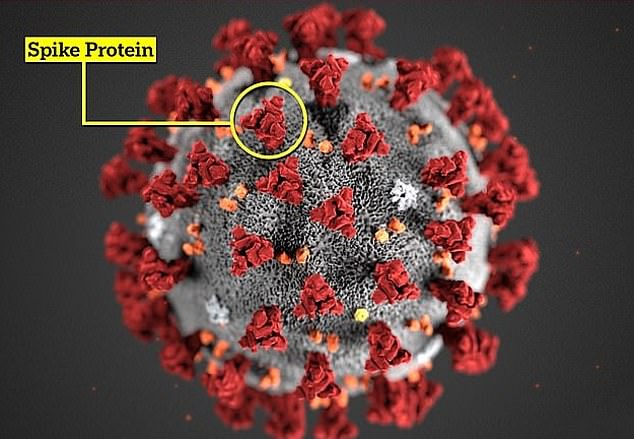Four more cases of the Brazilian coronavirus variant have been spotted in the UK, Public Health England revealed today.
The strain, known as P.1, was picked up in three patients in South Gloucestershire who were all close contacts or family members of two existing cases in the area.
Another person tested positive for the variant in Bradford, West Yorkshire, after returning from Brazil via Paris on February 14.
Contact tracing teams have followed up close contacts of the individual and advised them to isolate and get a test.
The latest cases bring the total number of P.1 variant cases in the UK to ten – seven in England and three in Scotland. All of the patient have links to travel or to a previously confirmed case that has travelled to Brazil.
Meanwhile, PHE said another new Covid variant which shares mutations with both the Kent and Brazilian variant had been identified in two patients.
The ‘Variant Under Investigation’ – which has not yet been named – was detected in tests carried out in the South East of England on March 4. Both patients had recently travelled to Antigua in the Caribbean.
The variant contains the spike mutations E484K, found on the Brazilian and South African variants, and N501Y, also present on the Kent strain.
But PHE said it was not concerned about the new strain because it is missing specific deletions in its genetic code that make those other strains more transmissible.
Four more cases of the Brazilian coronavirus variant have been spotted in the UK, Public Health England revealed today
The discovery of the Antigua strain means the agency now has five variants ‘under investigation’.
It has four more which it describes as ‘variants of concern’. The are: the current dominant Kent strain, two imported from Brazil, the South African variant and one which is thought to have originated in Nigeria, as well as two others which cropped up in Bristol and Liverpool.
So far UK health officials have managed to prevent major outbreaks of new variants, with the number of cases outwith the Kent strain limited to a few hundred.
PHE chief Sharon Peacock attributed a large part of that success to the draconian three-month lockdown that the country is only now starting to emerge from.
Some scientists have also suggested that the Kent variant is so much more transmissible than the other strains that it has an ‘evolutionary edge’.
Professor Peacock told a Royal Society of Medicine press briefing today: ‘It is a great hypothesis [that the Kent virus out-competes other variants].
‘But I think it is difficult to say at the moment, and the reason for that is we have been in a quite stringent lockdown so it appears to be the case that the other variants actually aren’t getting a foothold in this country.
‘But if we put them in a head to head race I wouldn’t like to say which would end up over the finish line first, but we do have a very established variant that is very transmissible [in the Kent one].’
She added: ‘It’s a contained situation but we have to keep watching every day and every week and also find out the biological reason why that would be the case.’
It comes after a study published on Wednesday suggested that, on top of being at least 50 per cent more transmissible, the Kent variant may also be twice as deadly as the original Covid strain.
Data from around 55,000 Britons revealed the B117 variant was 64 per cent deadlier than earlier versions of the coronavirus. But scientists admitted the risk of dying may actually be twice as high for people infected with the Kent strain.
Academics calculated this equated to the disease killing 0.41 per cent of everyone it infected in the study group — or one in 250 people.
For comparison, the original Covid strain had a lethality rate of around 0.25 per cent – one in 400 people — in a separate cohort matched by age and other factors which affect the risk of dying.
The research, carried out by academics at the universities of Exeter, Bristol, Warwick and Lancaster, was published in the British Medical Journal.
Despite the finding being worrying for the UK, scientists are certain that the current vaccines will work just as intended against the strain.
The study comes after No10’s top scientific advisers spooked the nation in January when they warned the variant, which first emerged in September, was up to 30 per cent deadlier than older versions.
It is hard to compare death rates between the first and second waves, to measure the impact of the different variants, because many people weren’t tested in the first wave, meaning the ratio of infections to deaths is wrong.
